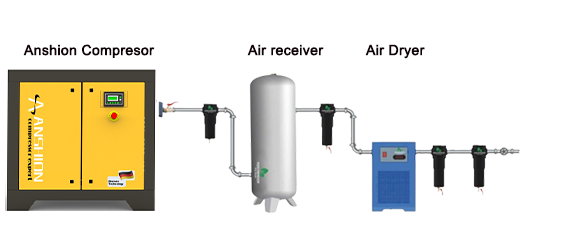2024/8/19 17:40:08
Resources
Why do air compressors need to be equipped with air receivers?
There are several reasons why air
compressors need to be equipped with air receivers, which together ensure the
stable operation, efficiency improvement, and equipment protection of the air
compressor system. This article will provide a detailed explanation of this
issue.
First, Balancing and stabilizing air
pressure
During operation, air compressors produce
compressed air, but gas consumption is not continuous and has certain
fluctuations. If the air compressor is directly responsible for responding to
this fluctuation, it will cause instability in its operation, and even damage
the equipment. The air receiver acts as a buffer device, effectively balancing
the gas fluctuation and maintaining the stable air pressure in the system. When
the air compressor produces more gas than the system consumes, the excess gas
is stored in the air receiver; when the system needs more gas, the air receiver
releases the stored gas to meet the system's needs. This balancing action
ensures stable operation of the air system and avoids equipment damage or
unstable operation caused by pressure fluctuations.
Second, Reducing energy consumption and
extending the life of air compressors
Air compressors consume a lot of energy
during startup and shutdown, especially the current during motor startup is
much greater than the normal operating current. By storing the compressed air
in the air receiver, the air compressor can operate at a constant pressure,
which reduces the energy consumption during startup and shutdown. Additionally,
the air receiver can also act as a buffer for the air pressure, reducing the
pressure fluctuations and extending the life of the air compressor. Frequent
starting and stopping not only increases energy consumption, but also
accelerates the wear and tear of the air compressor, shortening its service
life. The presence of an air receiver can significantly reduce the number of
start-ups and shutdowns of the air compressor. When the system's demand for gas
fluctuates within a certain range, the air receiver can release or store gas,
thus avoiding the frequent starting of the air compressor. This not only
reduces energy consumption, but also reduces the wear and tear of the air
compressor, extending its service life.
Third, Improving the stability of the air
system
The air receiver not only balances the
pressure, but also acts as a buffer to reduce the impact of airflow on the
system. Installing an air receiver between the air compressor and the air-using
equipment can make the flow of gas more stable and avoid equipment damage or
instability caused by airflow impact. In addition, the air receiver can also
improve air quality. After leaving the air compressor, compressed air will stay
in the air receiver for a period of time. During this period, impurities,
moisture, and other foreign substances in the air will settle down, and the
temperature of the air will decrease, thereby improving the quality of the air
delivered.
Fourth, Ensuring the automatic shutdown of
the air compressor
After the air volume in the air receiver
reaches a certain level, the unit will automatically shut down, thereby
reducing the unit's energy consumption. This function is of great significance
for energy saving and cost reduction. Meanwhile, it also avoids the unnecessary
running of the air compressor in the idle state, further improving the system's
efficiency.
Fifth, responding to sudden demand
In some cases, the gas consumption of the
air-using equipment may suddenly increase. If there is no air receiver as a
buffer at this time, the air compressor may not be able to meet this sudden
demand in time, leading to production interruption or equipment failure. The
existence of an air receiver can ensure that there is enough compressed air
available for use during sudden demand, thus ensuring the continuity and
stability of production.
Sixth, safety considerations
The air receiver, as a pressure vessel, is
designed and manufactured in accordance with strict safety standards. It can
withstand to some extent the changes in internal pressure and external impacts,
ensuring the safe operation of the system. At the same time, the air receiver
is equipped with various safety accessories, such as pressure gauges and safety
valves, for monitoring and controlling the pressure state of the system and
preventing dangerous situations such as overpressure from occurring.
In summary, the reasons for equipping an
air compressor with an air receiver include balancing and stabilizing pressure,
reducing energy consumption and extending the life of the air compressor,
improving the stability of the air system, ensuring the automatic shutdown of
the air compressor, responding to sudden demand, and safety considerations.
These reasons work together to ensure the stable operation and efficient
operation of the air compressor system. In practical applications, users should
select the appropriate type and specifications of air receiver based on their
own needs and conditions to ensure that the system achieves the best operating
effect.
